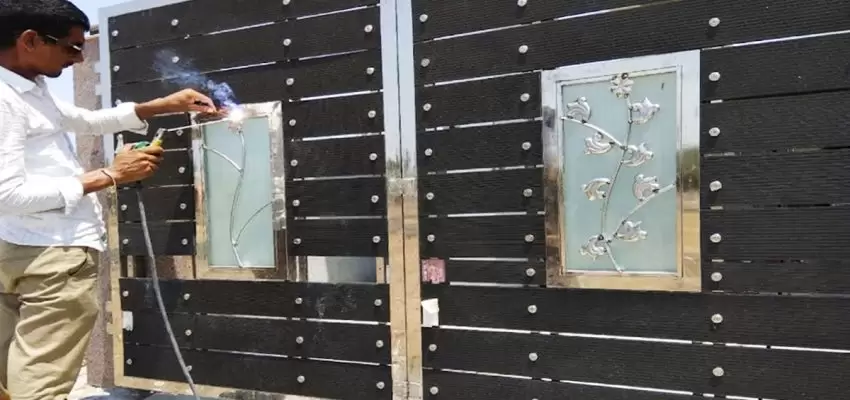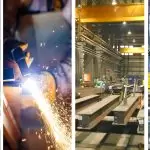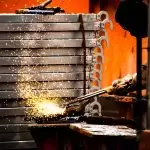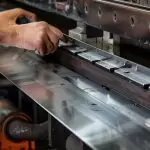Gate fabrication involves creating custom gates and railings to meet the unique needs and aesthetic preferences of homeowners and builders. As more homeowners opt for custom designs over mass-produced gates, the demand for specialty gate fabricators has grown significantly over the past decade.
Post your Requirement
This article will provide a comprehensive overview of gate fabrication services, including the different types of gates fabricated, typical fabrication materials and processes, considerations in choosing a gate fabricator, estimated costs, common customizations, maintenance needs, and industry trends empowering homeowners with the knowledge to get the perfect custom gates made for their property.
| Topic | Highlights |
| Gate Fabricators Near Me | Locate reliable gate fabricators in your vicinity for convenient service. |
| Steel Gate Fabricators | High-quality steel gates fabricated to ensure durability and security. |
| Sliding Gate Fabrication | Customized sliding gates tailored to fit your specific requirements. |
| Main Gate Fabrication | Design and installation of main gates for residential or commercial properties. |
| Gate Grill Fabricators | Fabrication of sturdy gate grills to enhance both security and aesthetics. |
| Fabrication Pipe Gate | Expert fabrication of pipe gates offering strength and functionality. |
Types of Gates Fabricated
Gate fabricators have the expertise to build a wide variety of gates, including:
- Swing Gates – The most common type of gate. They swing inward or outward to open and use hinges, allowing access for vehicles, pedestrians, or both.
- Slide Gates – Made of panels that slide along a track when opening/closing instead of swinging. Often electrically automated.
- Vertical Pivot Gates – Pivot open vertically from the center. Require less side clearance than swing gates. Popular for security/privacy.
- Double Gates – Two gates mirroring each other; allow wider access point without needing an extremely wide single gate.
- Pedestrian Gates – Smaller gates built specifically for pedestrian rather than vehicle access. May be integrated into larger vehicle gates.
Fabrication Materials
Common materials used for fabricating custom gates include:
- Wrought Iron – Classic material providing a timeless, elegant look. Can be cast into ornate designs. Requires regular maintenance to prevent rust.
- Aluminum – Lightweight, largely maintenance-free, and able to accept colorful finishes. Prone to dents/scratches requiring touch-ups.
- Steel – Durable and sturdy. Typically galvanized or powder coated to resist rusting. Industrial aesthetic.
- Vinyl – Low-maintenance and mimics wood look for a fraction of the cost. Limited strength compared to metal gates.
- Wood – Natural beauty of wood that can be carved/painted. Requires thorough weatherproofing and regular upkeep.
- PVC – Budget-friendly and maintains coloring better than vinyl. Lacks strength for larger gates.
Gate Fabrication Process
Building a custom gate is an intricate process including design, fabrication, finishing, installation, and follow-up:
- Consultation – Discuss needs/preferences, take measurements, determine optimal gate type and material.
- Design – Create technical 3D renderings detailing dimensions, materials, features per agreed upon consultation.
- Fabrication – Cut, weld, and assemble gate frame and infill sections based on design plans.
- Finishing – Clean welds, apply protective coatings, attach hardware/accessories, finish design elements.
- Installation – Hire third party or use in-house team to correctly install completed gate with proper swing/clearance.
- Follow-Up – Schedule maintenance checks and necessary touch-ups to ensure lasting integrity and aesthetics.
Choosing a Gate Fabricator
To get a gate that perfectly suits your needs and lasts for years, select a reputable metal gate fabrication company by assessing:
- Experience – Look for an established company with proven expertise building types of custom gates desired.
- Portfolio – Thoroughly examine sample pictures of past projects noting construction quality and design aesthetics.
- Materials/Processes – Determine their offerings match preferred gate material such as wrought iron or aluminum.
- Services – Choose a company handling the full process from design consultations through installations.
- Reviews – Check third party review sites and ask for referrals; select companies with consistently positive feedback.
- Warranties – Opt for those providing multi-year warranties on gate materials and fabrication work.
Gate Fabrication Costs
Custom gate fabrication costs vary greatly depending on:
- Gate Size/Design – More ornate designs and larger gates require more materials/labor.
- Gate Type – Vehicle slide or vertical pivot gates are typically costlier than basic swing gates.
- Gate Material – Luxury materials like wrought iron, cedar wood run higher than vinyl or aluminum.
- Automation Elements – Adding gate motors, access controls increases total gate costs.
- Professional Services – Design fees, installation charges also contribute to overall budget.
Common Customizations
Popular customizations for enhancing gate functionality, safety, and aesthetics include:
- Gate Motors/Automation – Allow remote and automatic gate opening adding convenience.
- Access Control Systems – Enhance security via intercoms, keypads, smart locks controlling gate access.
- Safety Elements – Motion sensors, warning signs prevent gate damage/injuries.
- Design Accents – Unique shapes, scrollwork, archways distinguish gates.
- Lighting – Ambient or security spotlights to improve night visibility around the gate area.
- Specialty Materials – Custom carved wood, copper infill panels make aesthetic statements.
Maintenance Needs
While specific maintenance requirements vary by material, properly caring for custom gates may involve:
- Touch-up Painting – Maintain protective coatings on steel and iron gates.
- Rust Removal – Regularly clean and seal cast iron and steel gates prone to rusting.
- Waterproofing – Annual sealing to protect ornate wood gates from water damage.
- Hardware Checks – Ensure hinges, gate stops and locking mechanisms function properly.
By following the manufacturer’s or fabricator’s maintenance recommendations, custom gates can remain functional and retain their eye-catching beauty for over 20 years.
Industry Trends
Several notable trends are shaping and advancing the gate fabrication sector such as:
- Automation – Remotely operated automated gates are becoming standard for convenience and prestige.
- Smart Integration – Gates incorporating access control systems tied into broader smart home ecosystems.
- Custom Design Focus – Growing demand for unique gate styles matching home/landscape aesthetics.
- Online Fabricators – New players offering streamlined online gate design and quoting.
- Decorative Metals – Intricate designs featuring mixed premium materials from wrought iron to copper.
- Sustainability – Use of recycled metals and greener production methods.
As technology evolves and design tastes shift, leading gate fabricators adapt by expanding their capabilities and end-to-end services to craft genuinely one of a kind, cutting-edge gates.
Conclusion
The right custom-fabricated gate makes an unforgettable first impression while adding privacy and property value for years to come. By selecting a reputable gate professional, homeowners can convert their unique vision into reality with expertly designed and constructed gates customized to match their precise specifications, styles and budget.
Knowing the extensive options for materials, types, accessories and services gate fabricators offer allows for fully optimized decision making when investing in high-quality custom gates. And by properly maintaining these customized gates, they will continue enhancing curb appeal and functioning flawlessly as a distinctive property focal point for decades on end.























Post A Comment